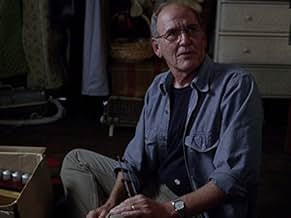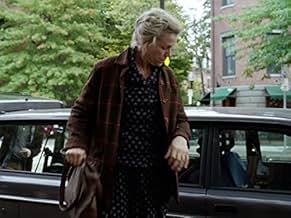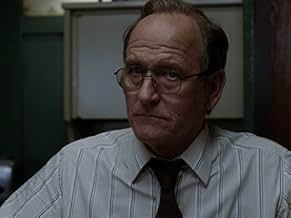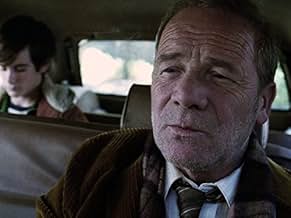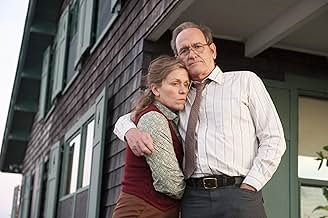Olive Kitteridge
- TV Mini Series
- 2014
- Tous publics
- 1h
A middle-school math teacher Olive and her marriage with Henry which spans 25 years.A middle-school math teacher Olive and her marriage with Henry which spans 25 years.A middle-school math teacher Olive and her marriage with Henry which spans 25 years.
- Won 8 Primetime Emmys
- 31 wins & 35 nominations total
Browse episodes
Featured reviews
This is an extra-ordinary piece of television. Where so many mini-series are constantly driven by a thread that drives it forward with momentum, this doesn't have that same urgency, which allows it to explore its themes in a way I don't think many TV series or mini-series have done. It's so wonderfully crafted, in all aspects. But really, it's the writing and performances where its true power soars. The acting is magnificent, McDormand might've just outdone her work in Fargo. A truly soulful, aching, incredibly heartfelt performance. We see Olive and her various flaws, and yet we can't help but sympathize with her and like her despite everything she does. The mark of a true revelation. Kind of hard to describe in words, but the acclaim is justified.
Olive Kitteridge is a fable regarding original people in original situations. The subtlety with which Lisa Cholodenko carries the four-hour mini-series is what emphasizes the story about a woman who is childish yet cruel, sappy yet caring, wildly honest yet deeply depressed.
I like Frances McDormand very much. Her cheekbones speak more than her mouth, and in here, the air she adopts of the titular character is splendid. She makes you wanna hate her and love her at the same time. Supported by the great Richard Jenkins and amusing Bill Murray, the story of the life of Mrs. Kitteridge is what we can relate to with our own lives. Elizabeth Strout's Pulitzer Prize winning novel gleams originality and its adaptation doesn't lag any behind.
The four episodes each talk about certain periods of her life and it ends with a very good moral. The characters hold truth in them and we start becoming judgmental, without even knowing it. Themes such as bereavement, depression, and paranoia is rampant in the series and you will be stunned to find connections between them.
The actors have been directed and shot well. The countryside locations serve as the perfect background for the story. I must say I am impressed by the whole cast and crew for giving me a piece of pie called Olive Kitteridge.
BOTTOM LINE: Not many people know about this series, and it will be my duty to recommend it to people who love original dramas that are not just crime-related a la Fargo (2014) and True Detective (2014).
Can be watched with a typical Indian family? YES
I like Frances McDormand very much. Her cheekbones speak more than her mouth, and in here, the air she adopts of the titular character is splendid. She makes you wanna hate her and love her at the same time. Supported by the great Richard Jenkins and amusing Bill Murray, the story of the life of Mrs. Kitteridge is what we can relate to with our own lives. Elizabeth Strout's Pulitzer Prize winning novel gleams originality and its adaptation doesn't lag any behind.
The four episodes each talk about certain periods of her life and it ends with a very good moral. The characters hold truth in them and we start becoming judgmental, without even knowing it. Themes such as bereavement, depression, and paranoia is rampant in the series and you will be stunned to find connections between them.
The actors have been directed and shot well. The countryside locations serve as the perfect background for the story. I must say I am impressed by the whole cast and crew for giving me a piece of pie called Olive Kitteridge.
BOTTOM LINE: Not many people know about this series, and it will be my duty to recommend it to people who love original dramas that are not just crime-related a la Fargo (2014) and True Detective (2014).
Can be watched with a typical Indian family? YES
You could watch this series along with "Terms Of Endearment" and get a really good dose of dysfunctional family dynamics. And learn something about growing old. And that we're not all that different. You can learn a lot from tough ol' broads. Or you can resent them. The one thing we know is, they will outlive their supposed time on Earth.
The titular character is played pitch perfect by Frances McDormand. Already an old soul when we first seen her in the Coen Brothers movies, she is the epitome of hard as rock stubborn New Englander. Educated by life experiences, her harsh reality is that tragedy has shaped her into a flawed diamond. Indestructible in her set ways, she lives with regret and unknowing to her (but every clear to us) projects her resentment towards the people who actually love her. Unfortunately, in her path is her kind hearted husband Henry Kitteridge (Richard Jenkins), in a stunningly sympathetic and patient man who reaches out to help lost young girls, but does so with the distancing manner of a father. There appears a sexual predator is a foot, but that isn't Henry's nature. He is the town pharmacist who we can see may have had bigger dreams in life, but is content to fulfill his duties to the community. He's seen first as a step rug, then a sounding board, but finally a man. All the parts of which make up a marriage in a small town community dynamic. We could've/would've/should've is pushed so far into the backburner as to cause conflict. And the developments of our youth are shaped by the overwhelming need of parents to control. You will reap what you sow. There wasn't a false moment in this mini-series. It's often painful, a lot of humor, bittersweet moments, tragedy and a lot of moments as I watched the outcome of their history turn to foreshadowed misery that I mutter "Damn that sucks that happened." Not out of pity, but that it is a universal storyline that we all get sickened by.
There are a lot of moments of grimness. In particular, the ease of resolution and mental issues. Even as late as my own generation, mental illness was seen as an embarrassment. People were considered spazzes if they were hyperactive. Or if their parent had drug addiction or drinking problems, they'd be ignored. The kids tend to shrug that off. That's the issue though. Cause life will give us obstacles in the form of relatives or spawn. We are owed nothing, but seem to carry on this notion we're suppose to be living someone else's life. We suppress our needs, if we genuinely care about people. Lost are the times when we hold back, now is the time when people often give up too soon. Is Olive's decision to power through life unhappy the right course for you? Probably not. But it's something to be admired. This mini-series is amazing.
The titular character is played pitch perfect by Frances McDormand. Already an old soul when we first seen her in the Coen Brothers movies, she is the epitome of hard as rock stubborn New Englander. Educated by life experiences, her harsh reality is that tragedy has shaped her into a flawed diamond. Indestructible in her set ways, she lives with regret and unknowing to her (but every clear to us) projects her resentment towards the people who actually love her. Unfortunately, in her path is her kind hearted husband Henry Kitteridge (Richard Jenkins), in a stunningly sympathetic and patient man who reaches out to help lost young girls, but does so with the distancing manner of a father. There appears a sexual predator is a foot, but that isn't Henry's nature. He is the town pharmacist who we can see may have had bigger dreams in life, but is content to fulfill his duties to the community. He's seen first as a step rug, then a sounding board, but finally a man. All the parts of which make up a marriage in a small town community dynamic. We could've/would've/should've is pushed so far into the backburner as to cause conflict. And the developments of our youth are shaped by the overwhelming need of parents to control. You will reap what you sow. There wasn't a false moment in this mini-series. It's often painful, a lot of humor, bittersweet moments, tragedy and a lot of moments as I watched the outcome of their history turn to foreshadowed misery that I mutter "Damn that sucks that happened." Not out of pity, but that it is a universal storyline that we all get sickened by.
There are a lot of moments of grimness. In particular, the ease of resolution and mental issues. Even as late as my own generation, mental illness was seen as an embarrassment. People were considered spazzes if they were hyperactive. Or if their parent had drug addiction or drinking problems, they'd be ignored. The kids tend to shrug that off. That's the issue though. Cause life will give us obstacles in the form of relatives or spawn. We are owed nothing, but seem to carry on this notion we're suppose to be living someone else's life. We suppress our needs, if we genuinely care about people. Lost are the times when we hold back, now is the time when people often give up too soon. Is Olive's decision to power through life unhappy the right course for you? Probably not. But it's something to be admired. This mini-series is amazing.
Never comfortable to watch, this gem as a story and as a vehicle for incredible performances is not to be missed. The story can be summarized in a very brief exchange between Olive and her husband Henry. The latter, a sucker for greeting cards it seems, buys Olive a simple little card that says "For My Wife". Inside the message is "Simply to say I love you" and his initial as a signature. It's Fathers Day, but he has purchased his wife some flowers and this card. He hands her the card and says "I love you." She reads it and replies "Yes, you do", handing him back both the card and the flowers with dirty garden-stained hands.
This is a dark, dismal, dreary narrative with extreme moments of touching emotion and fleeting happiness. Life for all of the characters in this story is a constant succession of negativity and hopelessness. And Olive is The Queen of the Depressed. Townspeople, too, are for the most part, cantankerous: Henry's initial store clerk; Olive's friend, Bonnie; the high school secretary; a customer standing in line at a pharmacy. Someone peed in all of their cereal. And it is the pathetic,somebody's-gotta-play-the-clown Henry who recommends to a Valium-addicted schizophrenic customer that she buy brighter light bulbs to fend off depression.
The performances are so intricate and under-played. How can playing a depressed person be intricate? Watch Frances McDormand's depiction of Olive. It's a must for any actor, and sheer joy for an audience member. And the supporting cast's performances are no less exemplary. Richard Jenkins as Henry provides phenomenal contrast. He really is the "yang" to Olive's "yin". And it is precisely this complementary distribution in their philosophies of life (as characters) and performances (as actors) that makes this truly one of the most amazing films. However, it is frequently extremely uncomfortable to watch because of the level of negativity we are compelled to watch. There are two scenes (one on a seaside cliff and the other at a piano bar) that are positively creepy but so perfect for the character who is envisioning them, another inhabitant of this Village of the Damned. Are there any happy people in this town? No. Henry and maybe one or two other characters try to cheer things up, but one feels as if they are doomed in their attempts to shed light on the rest.
This drama is sadly sympathetic, and no less pathetic a depiction of a jaundiced relationship than George and Martha in "Who's Afraid of Virginia Woolf?" The latter is certainly more bombastic than this film, which makes "Olive Kitteridge" even sadder as it is reflected in these lives of quiet desperation.
These are award-winning performances, script, and film. Don't miss it.
This is a dark, dismal, dreary narrative with extreme moments of touching emotion and fleeting happiness. Life for all of the characters in this story is a constant succession of negativity and hopelessness. And Olive is The Queen of the Depressed. Townspeople, too, are for the most part, cantankerous: Henry's initial store clerk; Olive's friend, Bonnie; the high school secretary; a customer standing in line at a pharmacy. Someone peed in all of their cereal. And it is the pathetic,somebody's-gotta-play-the-clown Henry who recommends to a Valium-addicted schizophrenic customer that she buy brighter light bulbs to fend off depression.
The performances are so intricate and under-played. How can playing a depressed person be intricate? Watch Frances McDormand's depiction of Olive. It's a must for any actor, and sheer joy for an audience member. And the supporting cast's performances are no less exemplary. Richard Jenkins as Henry provides phenomenal contrast. He really is the "yang" to Olive's "yin". And it is precisely this complementary distribution in their philosophies of life (as characters) and performances (as actors) that makes this truly one of the most amazing films. However, it is frequently extremely uncomfortable to watch because of the level of negativity we are compelled to watch. There are two scenes (one on a seaside cliff and the other at a piano bar) that are positively creepy but so perfect for the character who is envisioning them, another inhabitant of this Village of the Damned. Are there any happy people in this town? No. Henry and maybe one or two other characters try to cheer things up, but one feels as if they are doomed in their attempts to shed light on the rest.
This drama is sadly sympathetic, and no less pathetic a depiction of a jaundiced relationship than George and Martha in "Who's Afraid of Virginia Woolf?" The latter is certainly more bombastic than this film, which makes "Olive Kitteridge" even sadder as it is reflected in these lives of quiet desperation.
These are award-winning performances, script, and film. Don't miss it.
There will, I think, never be a film series that even approaches this film's excellence. It is one of the most uniquely cast and expertly played works of art I will probably ever experience. The performances were staggeringly riveting. Frances McDormand and the rest of her supporting cast were magnificent. I did not want it to end and I surely will not describe the minutiae of it for fear I would give away its essence.
Brava to Frances McDormand acting in and producing a film made for her and Bravo to Richard Jenkins, with whom I fell in love. Three cheers to all the other actors who made this film great.
This series brings the complexities of living to the screen. Life, as Olive says, confounds her and it does me as well. I'll bet most of us in our small worlds can say that too as life does not always live up to one's expectations of it and we are often trapped by those who came into our lives through no fault of our own. There were WONDERFUL performances all around. See it. It is a must.
Brava to Frances McDormand acting in and producing a film made for her and Bravo to Richard Jenkins, with whom I fell in love. Three cheers to all the other actors who made this film great.
This series brings the complexities of living to the screen. Life, as Olive says, confounds her and it does me as well. I'll bet most of us in our small worlds can say that too as life does not always live up to one's expectations of it and we are often trapped by those who came into our lives through no fault of our own. There were WONDERFUL performances all around. See it. It is a must.
Did you know
- TriviaFrances McDormand bought the rights of the novel years before she could make it into anything. Her involvement extended to the point of hiring writer Jane Anderson, director Lisa Cholodenko and co-star Richard Jenkins.
- ConnectionsFeatured in 72nd Golden Globe Awards (2015)
- How many seasons does Olive Kitteridge have?Powered by Alexa
Details
- Runtime
- 1h(60 min)
- Color
- Sound mix
- Aspect ratio
- 1.78 : 1
Contribute to this page
Suggest an edit or add missing content


